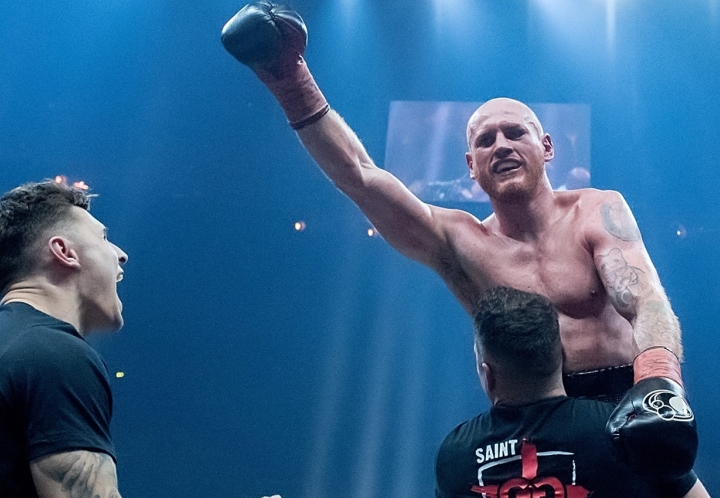By Tris Dixon
“When dealing with people, remember you are not dealing with creatures of logic, but creatures of emotion,” wrote American author Dale Carnegie.
The logic before the WBSS super-middleweight semi-final between George Groves and Chris Eubank was that the former was bigger, more experienced and likely more powerful, with his potent jab and dangerous right hand.
When you factored in emotion, that Eubank was the son of a British sporting icon and that he had impressed against inferior men or older veterans it was easy to be swayed.
Yes people use logic, but they can become victims of emotion.
Many felt Eubank’s time on the big stage had arrived.
Yet from round one, Groves’s left hand – held low – snaked out into the challenger’s face.
Groves was on a high alert, wired into the fight and the strategy – not the occasion and certainly not the oddsmakers who had made Eubank favourite.
After Groves took the first session, Eubank Sr asked his son in the corner to, ‘Bring him in to a hard fight’.
Yet the tempo of the bout remained the same, it was constant rather than relentless. A familiar pattern followed. The flow suited the more experienced Hammersmith man. Eubank looked at what was in front of him but he was not doing a great deal, certainly not enough to impress any sane person with a scorecard and a pen.
The 28-year-old Brighton man was continuously trying to get in close by dipping down low, perhaps so he could spring up with long range hooks and uppercuts. But all that happened was Groves either picked him off with jabs or moved back to harpoon him with lengthy rights. If Eubank found himself in the pocket, Groves claimed him and the attack was nullified.
Groves’s footwork was becoming the clear difference.
It is easy to look at a fight and say one is not doing enough, but Groves taking a step or half a step back kept it at a distance that was far more to his liking than Eubank’s.

It was a tactic Leo Santa Cruz used in the rematch with Carl Frampton – then trained by Shane McGuigan, only this time it was employed by Groves – trained by Shane McGuigan – against Eubank.
What was equally important, however, was Groves did not falter when Eubank was within striking distance. He was too proud and quite happy to mix in close when he felt it was needed.
That short step back, though, was making Eubank look increasingly clueless, clumsy and one-dimensional. He could not let his Instagram combinations flow from six feet away.
Plan A for Eubank, scoop in underneath George’s jab and jump in, was not working. We waited for Plan B. And we waited. We waited some more.
The Brighton man was outclassed on the outside and ineffective on the inside.
And the more the fight was fought at range, the more the feeling grew that it was because that is where Groves wanted it and Eubank was unable to do anything about it. Groves was contesting the fight he expected and wanted.
Frustrated, Eubank was beginning to chase success and smothered his own output.
Groves did not mind. He was winning and Eubank had been reduced to hopeful shots from distance. Some landed, nothing altered the trajectory of the fight.
He was more and more devoid of ideas.
For the uninitiated it might have been more about what Eubank could not do and was not doing, for those in the know, it was what Groves did not allow him to do.
He insured it was not a battle of wills, rather a contest of skill.
It was boxing, not fighting.
Around a minute into the last session, Groves launched a left and pulled his shoulder out. He continued with the beat-Eubank-at-any-game-he-wants attitude by battling away with one arm. They shared a richly violent finish, not in keeping with what had gone before but one that left ringsiders on their feet.
“It was about who wanted it most, and I wanted it most,” said a satisfied Groves, who claimed, with some merit, that at least two knockdowns should have been scored in his favour.
“He had some success when I did something wrong,” conceded the winner.
And that was an accurate and fair assessment.
It was the difference between leading and following. Groves led, Eubank followed. Eubank launched big shots, Groves called them.
So, too, did trainer Shane McGuigan. Let us not forget the flak he took after Frampton lost the rematch to Santa Cruz, or even how the Eubanks had referred to him as a PE Teacher.
McGuigan is a young man, learning as he goes and doing pretty bloody well.
He would have devised Groves’s strategy on Saturday along with his charge and they would have worked on it in the weeks leading up to the contest. They did not rely on luck, which is what Eubank seemed to need from the end of the first round until the end of the fight.
Of course, he nearly got it when Groves’s shoulder ‘went’ but that only served to illustrate Groves’s mental toughness.
He could have packed boxing in after Howard Foster ended his dream with the controversial stoppage in the first fight with Carl Froch. He could have cowered in the shadows after being poleaxed in the rematch, or thought it was not going to happen for him after losing a decision to Badou Jack in America.
He could have hidden from the game after the distressing injuries Eduard Gutknecht suffered in their fight.
But no.
He has shied away from no task, no man and no occasion.
Groves is a blend of emotion and logic, but thankfully through the roller coaster career he has endured and even thrived in he has remained defiant in his logic, that he would be the world’s number one super-middleweight and he would prove it against all comers.

ADD COMMENT VIEW COMMENTS (17)